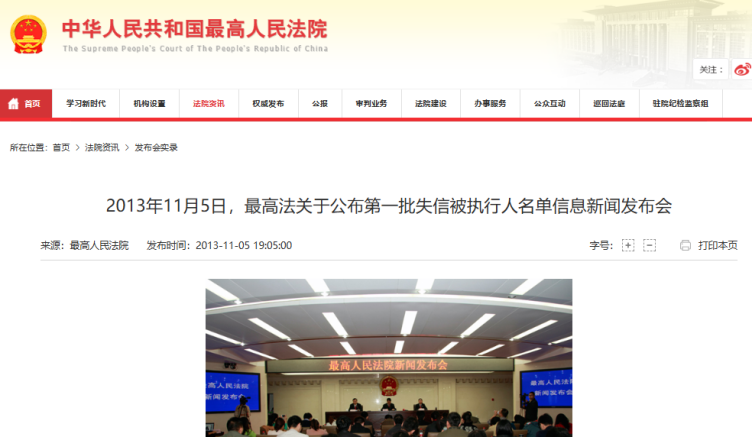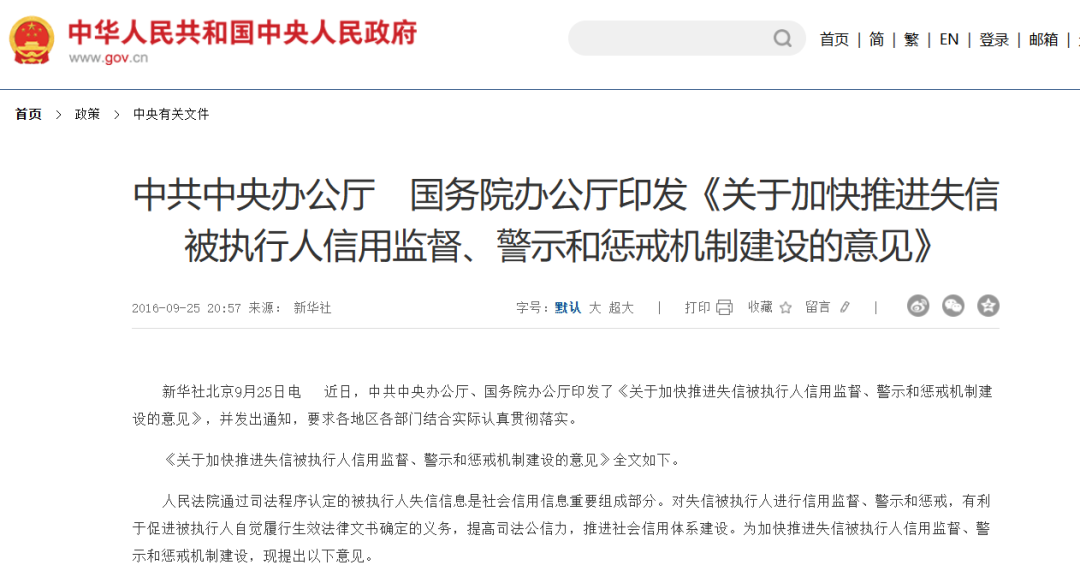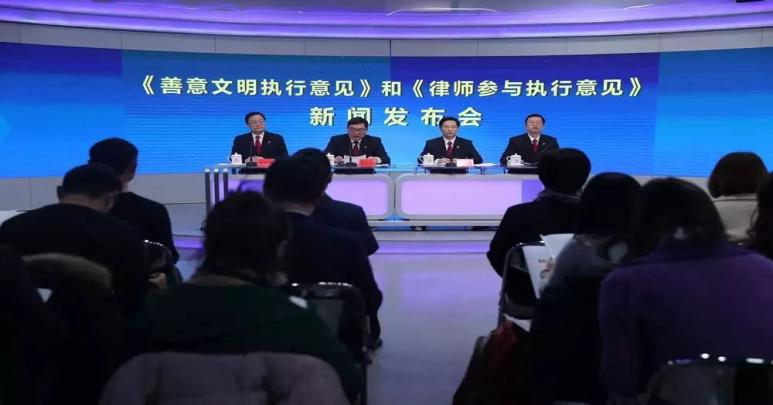New Measures for Punishing "Dishonesty" by the Supreme People's Court at the Two Sessions in 2025 (Part 2): Grace Period System
During the 2025 Two Sessions, the interpretation of the "Work Report of the Supreme People's Court" series of all media live interviews revealed that as of February 2025, a total of 16.2705 million executed persons (times) have voluntarily fulfilled the obligations determined by effective legal documents under the pressure of dishonesty punishment, or reached a settlement agreement with the applicant for execution through negotiation. The new measures of the people's court in the field of dishonesty punishment were also introduced, including promoting the classification of dishonesty punishment levels, establishing grace periods, and single unlocking mechanisms.

This article will interpret the second new measure for punishing "dishonesty" in the Supreme People's Congress and the Chinese People's Political Consultative Conference in 2025: the grace period system.
1、 How did the punishment system for dishonesty come about?
The "dishonest debtor" system is an important mechanism established in China's judicial field to solve the problem of "difficult execution" and promote the construction of the social credit system. Its formal institutionalization began with the implementation of the "Several Provisions of the Supreme People's Court on the Disclosure of Information on the List of Dishonest Persons Subject to Enforcement" on October 1, 2013.


Since 2013, disciplinary measures for dishonesty have often been "one size fits all". Those who fail to fully comply with effective judgments after filing a case will basically be included in the dishonesty list until they fulfill their enforcement obligations and apply to be removed from the dishonesty list. In some individual cases, the special circumstances of the executed person may have been overlooked, and even some of them may have fallen into dire straits due to temporary difficulties. Therefore, the Supreme People's Court has implemented a grace period system for punishing dishonesty.
On January 2, 2020, the Supreme People's Court held a press conference and released Article 15 of the "Opinions of the Supreme People's Court on Further Strengthening the Concept of Good faith and Civilized Execution in Execution Work", which stated that "a certain grace period should be appropriately set. Local courts may, based on the specific circumstances of the case, give a grace period of one to three months to the executed person who decides to be included in the list of dishonest persons or take measures to restrict consumption. During the grace period, their dishonest or restricted consumption information will not be released temporarily; if the deadline expires and the executed person still fails to fulfill the obligations determined by the effective legal document, their information will be released and corresponding disciplinary measures will be taken.
”

Regarding the issue of grace period mentioned by the journalist friend. According to the "Opinions on the Implementation of Good faith Civilization", not all cases are given a grace period. The grasp of this grace period should be determined by local courts based on the specific circumstances of the case, the willingness of the executed person to perform, and the degree of dishonesty. It is equivalent to giving him a chance to reform, deterring and urging him to actively perform. This situation is similar to the probation period in criminal punishment. Although he committed a crime and should be punished, given that his criminal behavior is not particularly serious, give him a chance to reform. If he abides by the law and reforms during the probation period, he will no longer be imprisoned. So the purpose and consideration of this grace period is to allow the debtor to automatically fulfill their obligations during the grace period. If they voluntarily fulfill their obligations during the grace period, we will no longer impose credit penalties and restrict their consumption.
3、 Is the grace period system for punishing dishonesty effective in practice?
During the 2025 National People's Congress and Chinese People's Political Consultative Conference, the interpretation series of the "Work Report of the Supreme People's Court" mentioned in a live broadcast interview with all media: "In the process of enforcing the rights of the enterprise's debtor, we strengthen the concept of good faith and civilized execution, and require more flexible and effective measures to be taken on the premise of fully protecting the legitimate rights and interests of the winning party. This not only allows the debtor who is in a liquidity crisis to continue production and operation, but also ensures that the plaintiff's rights and interests are 'hopeful, expected, and guaranteed', balancing 'strength' and 'warmth'

The Intellectual Property Court of Hainan Free Trade Port has accepted a trademark infringement enforcement case involving a foreign company and an e-commerce company in Hainan, with a subject matter of 2.17 million yuan. After the court froze and deducted 440000 yuan, the judge explained that refusal to execute would result in measures such as height limit and breach of trust, as the debtor had no other assets. The company stated that the financial difficulties were not intentionally avoided. In order to minimize the impact on the business activities of the enterprise and adhere to the concept of good faith and civilized execution, the court facilitated a settlement between the two parties, granted a grace period of 2 months, and temporarily suspended the height limit and breach of trust. The debtor shall fulfill the remaining 1.79 million yuan (including interest) within the grace period and fully execute it.
If Jilin High Court executes a dispute over engineering funds between a fire protection company and a construction group, and the defendant fails to fulfill the payment obligation due to business difficulties, direct execution will affect school teaching and migrant worker wages. The judge's investigation found that the defendant refused to pay due to financial difficulties caused by the plaintiff's delay. After multiple rounds of coordination, a grace period of three months was granted and the defendant has not yet been included in the list of dishonesty and height restrictions. The defendant raised 600000 yuan and reached a settlement to avoid the impact of disciplinary measures on the company's operations.
4、 What are the potential risks of the grace period system?
1. Malicious exploitation of the grace period system
The willingness of the executed person to perform is difficult to discern. Such as fabricating difficulties and taking advantage of the grace period to travel abroad. There may be individuals who have applied for multiple grace periods for breach of trust punishment but have not actually fulfilled their obligations. How to prevent the grace period from becoming a safe haven for "deadbeats"? Further institutional refinement is needed.
2. Unfair enforcement caused by regional judicial differences
Interference from local protectionism: Some regions abuse grace period policies to maintain local businesses.
3. Causing a decrease in execution efficiency
Some creditors believe that if the debtor is immediately included in the list of dishonest persons, the debtor will immediately pay the execution fee based on pressure. During the litigation stage, the defendant has already been given a long time to prepare for performance, and giving a grace period only makes the debtor more comfortable, but the creditor's entire execution and payment cycle becomes longer.
Unless a settlement is reached, granting a grace period for the debtor to be punished for breach of trust by the court may lead to dissatisfaction from the applicant for enforcement and an increase in enforcement objection cases.
Finally, the grace period system for "dishonesty" punishment does not weaken the strength of dishonesty punishment, but rather optimizes and upgrades it. Through precise identification and classification of policies, it not only maintains pressure on the executed persons who have serious illegal and dishonest behaviors, but also opens up relief channels for those who have encountered temporary difficulties.
In addition, as a creditor, one should require the other party to provide guarantees or clear property clues before the creditor's rights arise, and carry out property preservation during the litigation stage. At the same time, it is necessary to combine other enforcement measures, rather than relying solely on measures of dishonesty and height restrictions, to develop an integrated plan for litigation and enforcement.
Related recommendations
- Tax lawyers review the draft of the revised Tax Collection and Administration Law for soliciting opinions
- New Measures for Punishing "Dishonesty" by the Supreme People's Court at the Two Sessions in 2025 (Part 3): "Height Limit" Single Release Mechanism
- New Measures for Punishing "Dishonesty" by the Supreme People's Court at the Two Sessions in 2025 (Part 2): Grace Period System
- Interpretation of the Management Measures for Compliance Audit of Personal Information Protection - Feeling the Rhythm and Rhythm of Regulatory Flow



